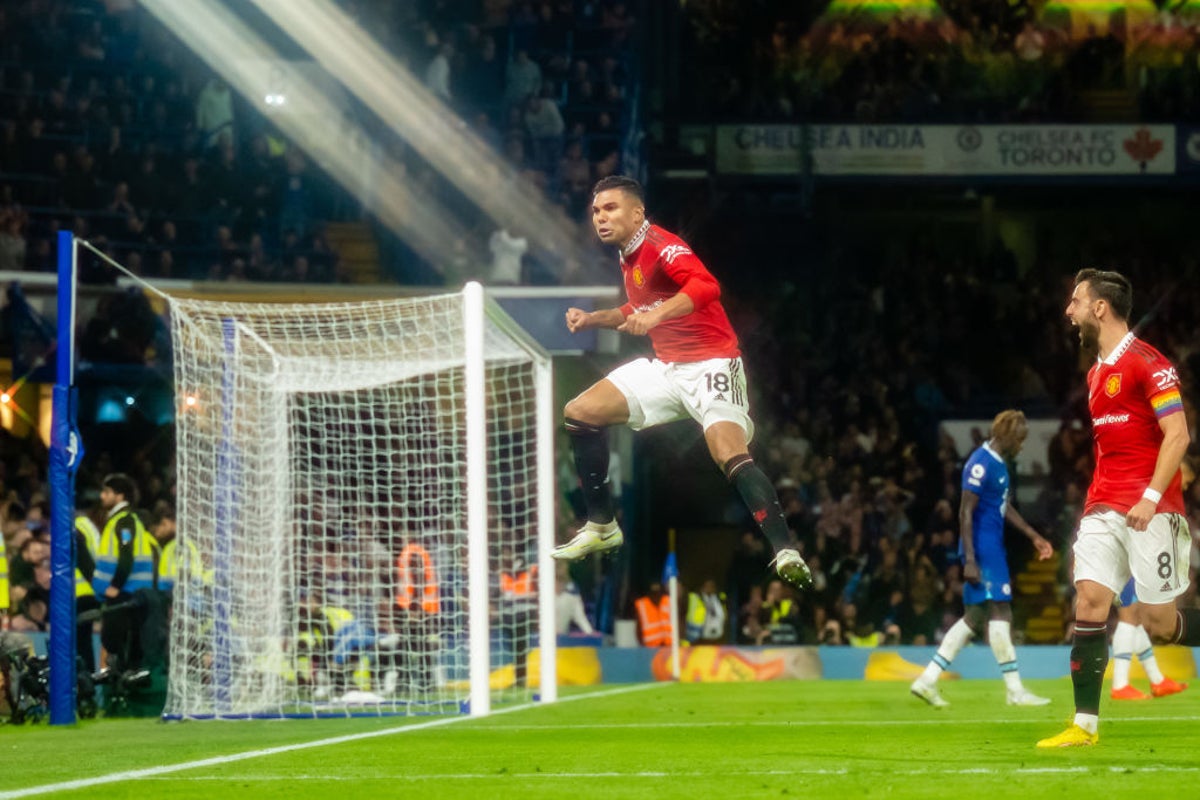
Casemiro forgot the first rule of being Casemiro. Briefly, anyway. A master of stealth had acted entirely typically by emerging unnoticed, even if the terrain – the Chelsea FC penalty area – was unexpected. But the towering, terrific header that brought an injury-time equaliser meant even he could not remain anonymous indefinitely.
Admittedly, he was overshadowed in the post-match debate. Roy Keane’s rants concerned a player with 450 goals for Real Madrid, not one with a relatively meagre 31. Casemiro spent years in the supporting cast at the Bernabeu. Even after an outstanding display, a first United goal and a point-saving intervention, he was relegated to the ranks of the subplot again. It felt entirely in character.
But if it is often the defensive midfielder’s lot that the discourse revolves around others, if Casemiro had been Real’s expert at the unflashy, their specialist in the unspectacular and if he is unlikely to concede a penalty as transparently clumsily as Scott McTominay did at Stamford Bridge, it is notable how eye-catching his excellence for Manchester United has been.
There was the assist for Cristiano Ronaldo’s 700th club goal at Everton, for instance, some ferocious long-range shots and a range of diagonal passes that show him as a constructive presence, not just a destructive one. Perhaps, having been the selfless support act to Luka Modric and Toni Kroos for so long, he has been liberated by joining a club where the midfield used to consist of McFred. Now he has the licence to pass. If Casemiro had felt a very different alternative to Frenkie de Jong, a seeming symptom of United’s confused thinking, the notion that buyers should not compromise and look further down the shortlist has been rebuffed.
If the midfield all-rounder, the Keane type, was supposed to be consigned to history, United have rediscovered one in the guise of a destroyer. For those who care about such statistics, he averages more shots per 90 minutes than Jadon Sancho, more key passes than Marcus Rashford. Only Bruno Fernandes, Rashford and Diogo Dalot have a higher expected assists total for United this season. Meanwhile, for the second time in four days, he won possession 10 times in a game.
Casemiro may support Malcolm Gladwell’s weak link theory about football: that upgrading the weakest link is the best way of dramatically improving a team. The heart of United’s midfield has been a wilderness for spells of recent seasons. Casemiro feels a transformative presence: with a £60m fee for a 30-year-old, he ought to be, but too few of United’s big buys have been of late. Perhaps Antony belongs in the same bracket, because right wing has been a problem position when United cunningly assembled a bunch of attackers who all seemed to prefer the left.
There are reasons to believe United paid over the odds for both; for Lisandro Martinez, too, with their combined cost around £200m. Had others been the bidders, the asking price might have been lower. Yet for clubs of United’s resources, getting it right matters more than getting a bargain fee.
And the other club most obviously flaunting their wealth in the summer was Chelsea. There is a danger of judging too hastily – rewind three weeks and Casemiro, yet to start a Premier League game, was benched for a Manchester derby United lost 6-3 – but thus far Chelsea have derived less from their summer spending.

In part, it is a consequence of muddled thinking in the boardroom. The outlay came under Thomas Tuchel; Graham Potter was then brought in with a squad expensively refitted for his predecessor. That Potter omitted Kalidou Koulibaly and Wesley Fofana, some £100m of centre-back, for his debut showed his doubts, especially about the Senegalese, who has now been benched three times by Potter. That Fofana was soon injured leaves him looking luckless and a reason why Chelsea’s rebuild appears so incomplete.
Pierre-Emerick Aubameyang has merit as a short-term signing. But Potter has picked Raheem Sterling at wing-back at times; the scorer of the first goal of his reign has not found the net since and was particularly poor against United.
Then there is the curiosity of Marc Cucurella, a better player for Potter’s Brighton than for Potter’s Chelsea. Fofana’s absence is a reason why he was used as a left-sided centre-back on Saturday, but the presence of Ben Chilwell, a fine left-back, meant such versatility seemed part of the reason to commit a colossal £63m for him. Cucurella’s last three starts have been curtailed, all due to tactical decisions or poor performances: one at half-time, one after the hour and the latest in the first half. He has come to look Chelsea’s weak link, and a particularly expensive one at that. He isn’t in their strongest side right now.
None of which could necessarily condemn his Chelsea career to failure, even if they would no doubt prefer he comes good quicker than Kepa Arrizabalaga, finally flourishing in his fifth season. But if Casemiro was the short-term signing, his impact has come immediately after his introduction to the starting 11. If the scoreline was level on Saturday and Chelsea remain better off in the table, in another sense United are winning the battle of the big buyers.







